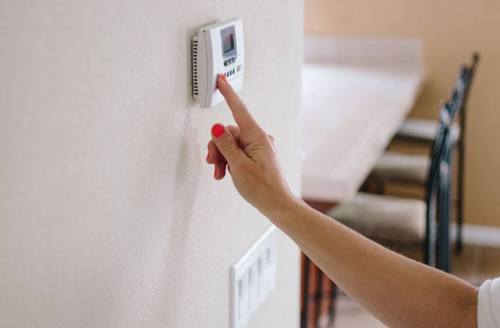Constantly fighting over the thermostat? Here’s why some people “run hot” or cold
Currently battling it out with your office mates over the thermostat setting? Here's why you may run hot while your colleagues run cold (or vice versa).

Recently, I read a Vanity Fair interview with Michelle Williams (Brokeback Mountain, not Destiny’s Child) in which she said she’d heard that hotel rooms were kept cool to accommodate men, who tend to “run warmer” than do women. Given that I’d just spent a weekend with my entire family under one roof, waging a gendered war over the thermostat setting—the men wanted it at arctic levels while the women were hoping for balmier conditions—I started to wonder about the realities of the sex-based difference in temperature preference. I also wanted to know, more generally, why some people—male or female—”run hot” while others, like me, are perpetually frozen.
Amy E. Chadwick, ND, Licensed Naturopathic Doctor at Four Moons Spa in Encinitas, California, tells me a number of things play into our experience of temperature. Below, she shares a wide range of factors, many of which actually are (spoiler alert!) gendered.
Keep reading to 8 factors that cause you and your office mates battle over the thermostat.

Thyroid function
Your thyroid plays an important role in regulating body temperature. “The body maintains a relatively steady core temperature by adjusting blood flow and heat generation within the cells,” Dr. Chadwick explains. And it’s your thyroid’s job to increase metabolic rate (how much energy your body is using) in the cells in order to create more body heat. So, she tells me that if you find yourself consistently on one end of the temperature spectrum or the other, you may want to look into getting your thyroid checked. “If someone is constantly cold or has a generalized lower basal body temperature [the lowest temp of your body at rest] it may be due to low thyroid activity,” she says. “And, hyperthyroidism may cause a slightly increased body temperature and intolerance to heat.”
Hypothalamus function
Meanwhile, Dr. Chadwick adds, your core temperature is also regulated through the hypothalamus in the brain, which means its individual function is a crucial factor, too. The good news here, she says, is that the hypothalamus rarely goes out of whack unless it’s damaged due to a tumor, brain surgery, a traumatic brain injury, or, sometimes, extreme eating disorders.
Autonomic nervous system
Okay, so here’s where gendered differences start to pop up. Dr. Chadwick tells me that generally, women actually have a more efficient thermoregulatory system, meaning they can maintain a more even core temperature under extreme changes in external temps than men; however, they—and especially their hands and feet—are also more sensitive to changes in temperature and will feel cold more quickly.
I’m gonna let Dr. Chadwick explains why and how this works, because she can put it better than I can: “The autonomic nervous system [the part of the nervous system responsible for controlling automatic bodily functions such as breathing] regulates the tension placed on the blood vessels. This allow for circulation to be shunted more toward the core or out to the periphery based on need. Women seem to have a more sensitive autonomic nervous system and, when exposed to cold, will efficiently shunt blood flow towards their core, leaving their extremities, especially hands and feet, with less blood flow and therefore a much lower surface temperature. The sensation of cold at the hands and feet will then quickly translate into a perception of being cold, even if the core is maintaining a normal temperature.”
Your autonomic nervous system—specifically its intensity and pattern—is affected by stress, digestive demand, and individual temperament, she says.
Body size and muscle mass
Muscles help you generate heat—Dr. Chadwick tell me they produce around 25 percent of your body’s normal temperature. As a result, people with greater muscle mass tend to run warmer than others. Generally speaking, there is a gender difference here, but people come in all shapes and sizes so the disparity is by no means across the board.
Smaller people—those who have a higher ratio of surface area to volume—also tend to run less hot than their larger counterparts. Since often these less large humans are female, Dr. Chadwick speculates that the ability to quickly shunt blood to the core—as outlined above—may be an adaptive response to protect women and allow them to adapt to colder temperatures and maintain their core temperature.

Menstrual cycle
I tend to feel like I’m on fire when I’m PMSing, so it comes as no surprise to me that your cycle can influence your body temperature as well. Dr. Chadwick explains to me, however, that these hormonal effects are slightly more complicated than you might imagine. “While estrogen, progesterone, and testosterone do affect thermoregulation, circulation, and the metabolic demands at the cell, their effect on overall temperature sensation is less directly related to their activity and more related to the autonomic nervous system,” she explains. “When hormone activity is altered, either through normal life changes [puberty, the menstrual cycle, pregnancy, or menopause] or via surgery or medication, the autonomic nervous system plays a larger role in managing some of the activities of the hormones and the physical sensations may become exaggerated or altered.”
Hormone fluctuations aren’t the only way your cycle influences your temperature, however. “Women have a normal increase in pelvic congestion [reduced blood circulation in and out of the legs] that varies with their menstrual cycle, and this congestion can inhibit optimal blood flow to the feet and contribute to colder feet,” she explains. This congestion, she says, isn’t only caused by your cycle, either. “Long periods of sitting without enough exercise, chronic muscle tension in the low back and pelvic floor, excess sympathetic nervous system activity, and chronic constipation or inflammation in the lower digestive tract can impact the circulation to and from the legs, and blood and lymph accumulate in the pelvis,” Dr. Chadwick explains. “With excess estrogen activity and excess tissue growth in the uterus each cycle, with fibroids or endometriosis, we will also see more pelvic congestion.”
Deficiencies and disease
If you run cold, you may be suffering from anemia, says Dr. Chadwick. “Anemia can solicit a change in autonomic activity that favors colder hands and feet, with a sensation of being cold,” she says. Since it’s more common in women than men, this, too, may account for a gendered difference in temperature sensitivity.
Dr. Chadwick also tells me certain diseases may cause temperature abnormalities. Diabetes, for example, can affect circulation to the small vessels of the fingers and toes and affect the nerves that sense temperature. This means that if the extremities become cold, for example, the proper signals will not be sent to the hypothalamus and the person will not feel cold. Another issue for those with this disease—as well as those with hypertension, obesity, and cardiovascular disease—is that the body’s ability to dissipate excess heat efficiently may be inhibited. “They are not able to to efficiently cool down with compromised circulation,” explains Dr. Chadwick. “They more feel overheated more quickly and also can be at risk for thermal stress and heat stroke.”
Raynaud’s disease, meanwhile, is a spasm of the peripheral blood vessels that does not allow for optimal blood flow and circulation to the hands and sometimes toes, which can significantly aggravate the sensation of cold in these limbs. It, like anemia, is more common in women than men.
Activity level
If you somehow need yet another reason to sweat, here it is. “Exercise tends to decrease overall temperature sensitivity in both men and women,” says Dr. Chadwick.
Age
Remember that whole muscle-mass component outlined above? Well, the elderly tend to lose not only muscle mass but fat stores for the generation of heat. Their nerves, says Dr. Chadwick, may also lose some of their capacity to send efficient signals to the brain when there is a temperature change. “This can make it more difficult to regulate overall temperature and may favor a tendency to feel cold more easily and also possibly overheat more easily,” she explains.
Want to know more about how your body functions? Get all the TMI on what your poop, period, body odor, and ear wax say about your health.










